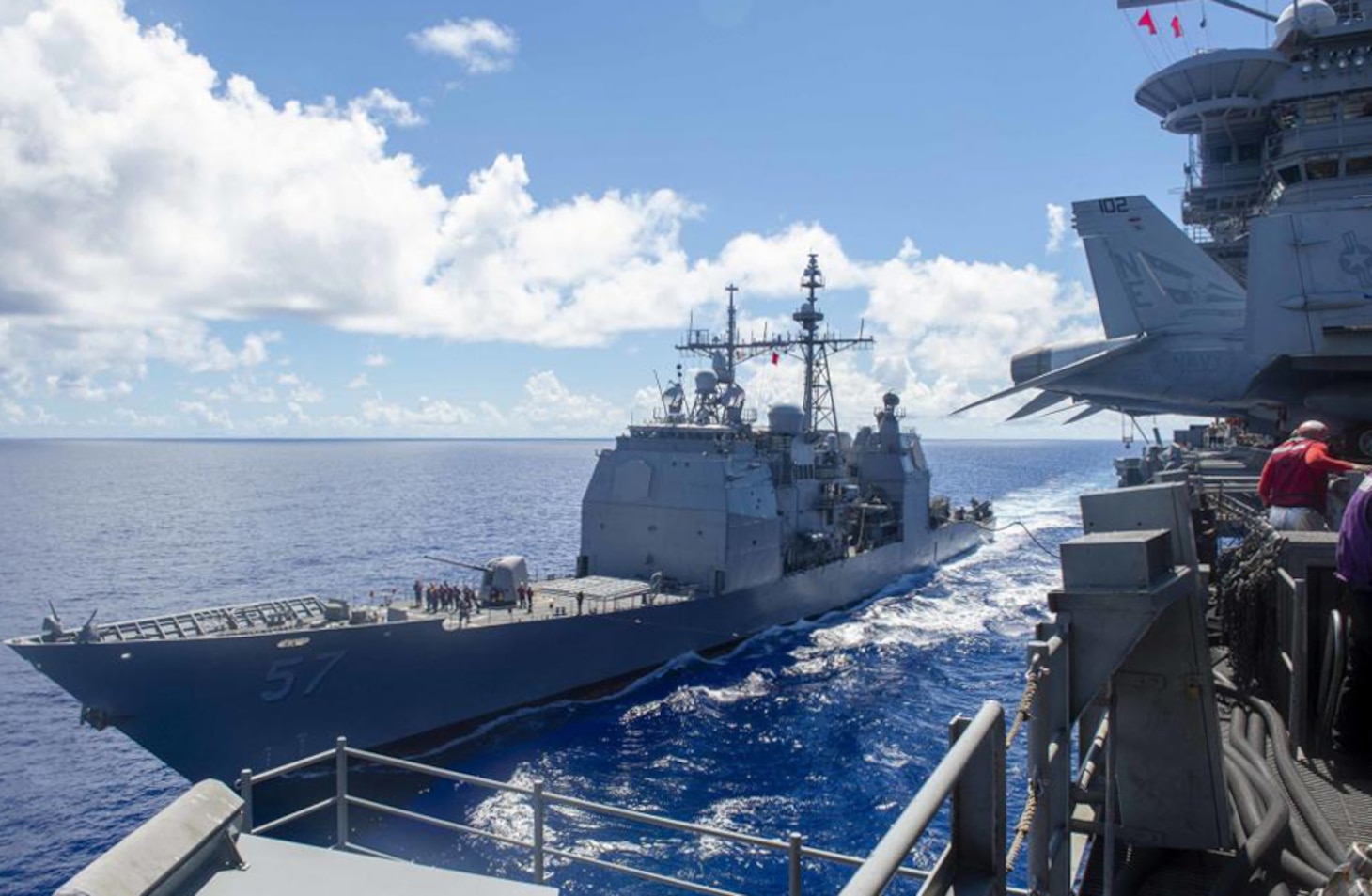By MC1 Tyler Fraser, USS Carl Vinson
PHILIPPINE SEA – Nimitz-class aircraft carrier USS Carl Vinson (CVN 70) conducted a fueling-at-sea (FAS) with Ticonderoga-class guided-missile cruiser USS Lake Champlain (CG 57), Sept. 17, delivering more than 150,000 gallons of fuel and setting a milestone of more than 1 million gallons delivered to other ships since January.
Vinson refueled nine different ships, including destroyers, cruisers and littoral combat ships, during 15 separate FAS evolutions.
“Although carriers have the capability to deliver fuel to ships using their FAS rig, it is normally for certification only,” said Lt. Cmdr. David Roach, Vinson’s first lieutenant. “One million gallons is a typical amount of fuel if we were a fleet oiler, but for an aircraft carrier, it is not.”
At-sea fueling operations enable ships to continue their mission without pulling into port for fuel.
Capt. P. Scott Miller, Vinson’s commanding officer, said FAS keeps assets on station longer, keeping them in the fight.
“It is vital that our assets are ready to conduct any required mission in support of peace and stability throughout the Indo-Pacific,” said Miller. “Successfully conducting FAS operations to this degree speaks volumes to the capability and proficiency of our Sailors. It also demonstrates the operational readiness of our strike group and our commitment to our network of allies and partners in the region. Fueling-at-sea keeps ships on station and puts our jets in the air, ensuring we can continue to fly, sail and operate wherever international law allows.”
Chief Warrant Officer Mae Lazo, Vinson’s bos’n, said fueling evolutions are no small feat and require coordination across multiple departments.
“To make this evolution happen is a ship-wide affair,” said Lazo. “It requires careful planning among the aviation boatswain’s mates (fuels) in air department, boatswain’s mates in deck department, electrician’s mates and machinist’s mates in engineering department and Sailors on the bridge with the navigation department.”
In addition to coordination among the carrier’s crew, Destroyer Squadron (DESRON) 1 led planning and coordination for many of the ships receiving fuel.
“Fueling at sea ensures our destroyers, cruisers and littoral combat ships maintain a high level of warfighting readiness and sustain operations underway where our ships are most needed,” said Capt. Gilbert Clark, DESRON 1’s commodore. “Our continued at sea presence in the Indo-Pacific region promotes security and stability, which in turn drive the peace and prosperity that benefit all regional countries.”
FAS was first developed around 1900 for transferring coal and was perfected by the U.S. Navy in the 1920s and 1930s. For transferring liquids such as fuel, ships pull alongside each other with the receiving ship pulling alongside the supplier at a distance of approximately 30 yards. A gunline, pneumatic line thrower, or shot line is fired from the supplier, which is used to pull across a messenger line. This line is used to pull across other equipment such as a distance line, phone line, and the transfer rig lines. These rigs are then used to transfer fuel between the ships.
The Carl Vinson Carrier Strike Group (VINCSG) is led by Carrier Strike Group (CSG) 1 and includes Vinson, embarked Carrier Air Wing (CVW) 2, embarked staffs of CSG 1 and Destroyer Squadron (DESRON) 1, Ticonderoga-class guided-missile cruiser USS Lake Champlain (CG 57) and Arleigh Burke-class guided-missile destroyer USS Chafee (DDG 90).
VINCSG’s multiplatform team of ships, aircraft and more than 7,000 Sailors is capable of carrying out a wide variety of missions around the globe. VINCSG is deployed to the U.S. 7th Fleet area of operations in support of a free and open Indo-Pacific region. U.S. 7th Fleet conducts forward-deployed naval operations in support of U.S. national interests in the Indo-Pacific area of operations. As the U.S. Navy’s largest forward-deployed fleet, 7th Fleet interacts with other maritime nations to build partnerships that foster maritime security, promote stability and prevent conflict.
This article was published on September 20, 2021 by the U.S. Navy.
Featured Photo: The aircraft carrier USS Carl Vinson (CVN 70) conducts a fueling-at-sea with guided-missile cruiser USS Lake Champlain (CG 57) in the Philippine Sea, Sept. 17. (U.S. Navy photo by Mass Communication Specialist Seaman Mason Congleton)


